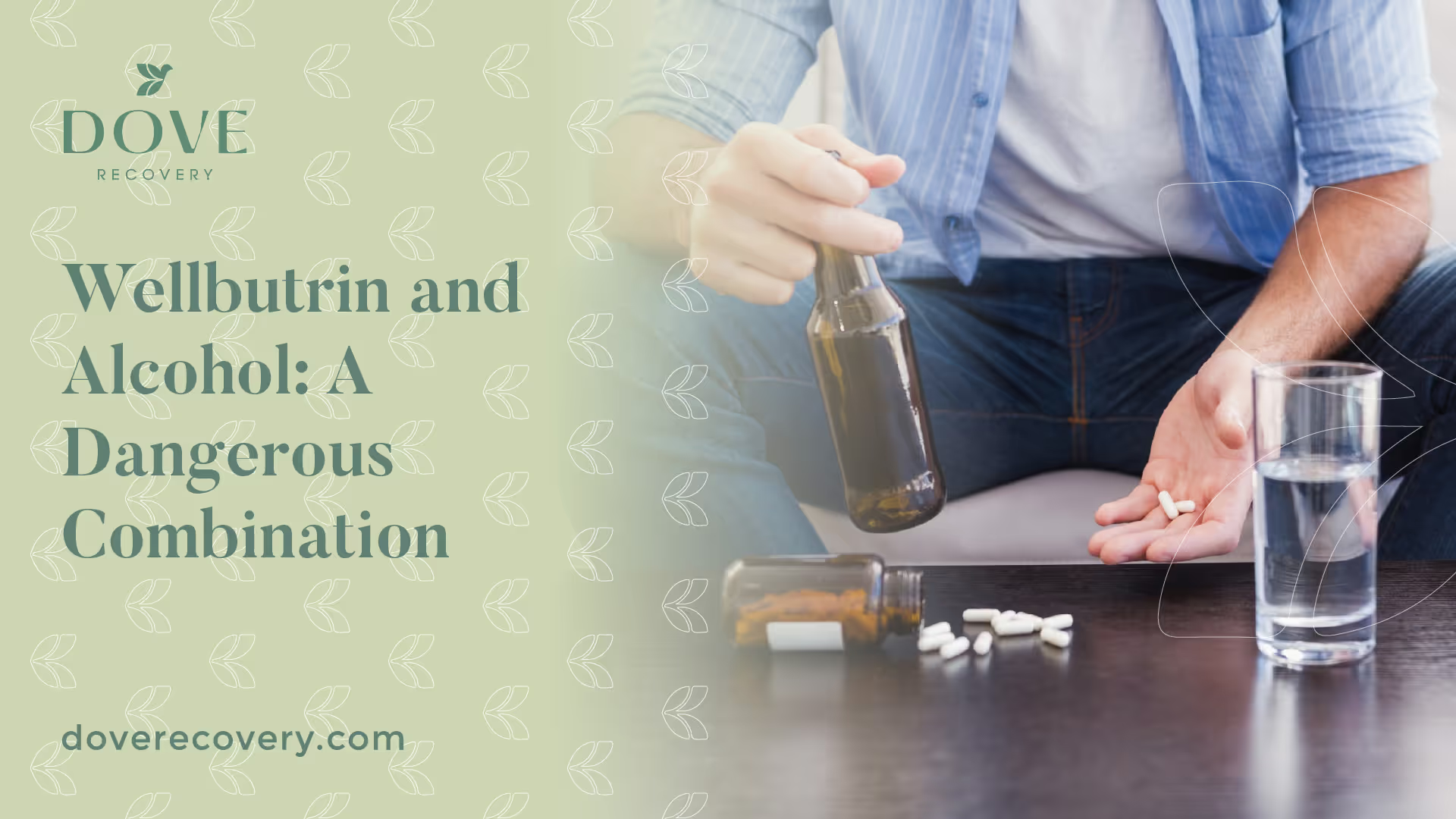Wellbutrin and Alcohol: A Dangerous Combination

Understanding Wellbutrin and Alcohol Interaction
When it comes to the combination of Wellbutrin and alcohol, it's important to understand the potential risks and interactions that can occur. Mixing Wellbutrin and alcohol can have detrimental effects on both your physical and mental health. In this section, we will explore the risks of mixing Wellbutrin and alcohol and how they interact in the body.

The Risks of Mixing Wellbutrin and Alcohol
Combining Wellbutrin and alcohol can pose several risks and may increase the likelihood of experiencing adverse effects. Alcohol is a central nervous system depressant, and when consumed alongside Wellbutrin, which is an antidepressant medication, it can have compounded effects on the body. Some of the potential risks of mixing Wellbutrin and alcohol include:
- Increased risk of seizures: Wellbutrin has been associated with a higher risk of seizures, especially at higher doses. Alcohol can lower the seizure threshold, making it more likely for seizures to occur when combined with Wellbutrin.
- Worsening of mental health symptoms: Alcohol is a known depressant and can worsen symptoms of depression and anxiety. When taken with Wellbutrin, which is prescribed to manage these symptoms, the effectiveness of the medication may be compromised.
- Impaired judgment and coordination: Both alcohol and Wellbutrin can impair judgment, coordination, and cognitive function. Combining the two substances can exacerbate these effects, leading to impaired driving skills and an increased risk of accidents.
How Wellbutrin and Alcohol Interact in the Body
Wellbutrin, also known by its generic name bupropion, works by affecting the levels of certain chemicals in the brain that are involved in mood regulation. Alcohol, on the other hand, affects the central nervous system and can alter brain activity. When Wellbutrin and alcohol are consumed together, they can interact in the following ways:
- Increased sedation and drowsiness: Both Wellbutrin and alcohol have sedating effects. When combined, they can intensify these effects, leading to excessive sedation and drowsiness.
- Negative impact on liver function: Both Wellbutrin and alcohol can put strain on the liver. Combining them can further burden the liver and potentially lead to liver damage or impairment.
- Heightened risk of overdose: Alcohol can impair judgment and decision-making abilities, making it more likely for individuals to take higher doses of Wellbutrin than prescribed. This increases the risk of an overdose, which can have severe consequences.
Given the risks associated with mixing Wellbutrin and alcohol, it is generally recommended to avoid alcohol consumption while taking Wellbutrin. However, individual differences and sensitivities may vary, and it is essential to consult a healthcare provider for personalized advice.
Understanding the potential dangers of combining Wellbutrin and alcohol can help you make informed decisions about your health and well-being. It is important to prioritize your safety and seek support if you are struggling with alcohol cravings or dependency. Explore alternative coping strategies and reach out to healthcare professionals for guidance.
Potential Side Effects
When considering the combination of Wellbutrin and alcohol, it is crucial to be aware of the potential side effects that can arise from this interaction. Mixing Wellbutrin, a medication commonly prescribed for depression and other mental health conditions, with alcohol can have detrimental effects on your well-being. Here are some of the potential side effects:
Increased Risk of Seizures
One of the most significant risks of combining Wellbutrin and alcohol is an increased risk of seizures. Both substances individually have the potential to lower the seizure threshold, meaning they can make seizures more likely to occur. When used together, the risk is further amplified. This is particularly important for individuals who are already prone to seizures or have a history of epilepsy. It is crucial to prioritize your safety and avoid this potentially dangerous combination.
Worsening of Mental Health Symptoms
Mixing Wellbutrin and alcohol can lead to a worsening of mental health symptoms. Alcohol is a depressant that affects the central nervous system, while Wellbutrin is an antidepressant that works to improve mood and alleviate symptoms of depression. Drinking alcohol while taking Wellbutrin can interfere with the effectiveness of the medication, potentially nullifying its positive effects. Additionally, alcohol can exacerbate symptoms of depression, anxiety, and other mental health conditions. It is essential to prioritize your mental well-being and avoid this combination.
Impaired Judgment and Coordination
Another potential side effect of mixing Wellbutrin and alcohol is impaired judgment and coordination. Alcohol is a substance that can impair cognitive function and motor skills, leading to reduced coordination and slower reaction times. Wellbutrin, on the other hand, can also have a stimulating effect on the nervous system. Combining these two substances can intensify the impairment and increase the risk of accidents, falls, and other adverse consequences. It is crucial to prioritize your safety and avoid any activities that require alertness and coordination when using Wellbutrin.
Understanding the potential side effects of combining Wellbutrin and alcohol is vital for your well-being. It is essential to consult your healthcare provider regarding the use of alcohol while taking Wellbutrin. They can provide personalized advice based on your specific health needs and medication regimen.
Dangers of Combining Wellbutrin and Alcohol
Combining Wellbutrin and alcohol can have serious consequences for your health and well-being. It is crucial to understand the potential dangers associated with this combination to make informed decisions about your own health.
Increased Sedation and Drowsiness
One of the significant risks of mixing Wellbutrin and alcohol is the increased sedation and drowsiness that can occur. Both substances can individually cause drowsiness, but when combined, their effects are intensified. This can impair your ability to think clearly, make sound judgments, and react quickly, thereby increasing the risk of accidents and injuries.
Negative Impact on Liver Function
Both Wellbutrin and alcohol can have an impact on liver function. Wellbutrin is metabolized by the liver, and alcohol is processed by the liver as well. When used together, the liver may become overwhelmed by the simultaneous breakdown of these substances. This can lead to liver damage and interfere with the liver's ability to perform its vital functions, such as detoxification and the processing of medications.
Heightened Risk of Overdose
Combining Wellbutrin and alcohol increases the risk of overdose. Alcohol is a depressant, and Wellbutrin is an antidepressant that affects the levels of certain neurotransmitters in the brain. The combination of these substances can have unpredictable effects on the central nervous system and may result in an overdose. Symptoms of an overdose can include seizures, hallucinations, rapid heart rate, confusion, and even loss of consciousness.
It is important to note that the specific risks and severity of these dangers can vary depending on individual factors, such as the dosage of Wellbutrin, the amount of alcohol consumed, and individual sensitivities. To fully understand the potential risks associated with your specific situation, it is crucial to consult with a healthcare provider who can provide personalized advice and guidance.
If you or someone you know is struggling with alcohol cravings while taking Wellbutrin, it is important to seek support and professional help. There are resources available that can provide assistance in managing alcohol cravings and exploring healthier coping mechanisms.
Remember, the combination of Wellbutrin and alcohol can be potentially harmful. Prioritize your health and well-being by making informed choices and seeking professional guidance when needed.
Can You Drink Alcohol While Taking Wellbutrin?
When it comes to combining Wellbutrin and alcohol, caution should be exercised due to the potential risks and interactions between the two substances. Understanding the medical recommendations and individual sensitivities is essential for making informed decisions.
Medical Recommendations and Warnings
Medical professionals generally advise against drinking alcohol while taking Wellbutrin. Alcohol can interfere with the effectiveness of the medication and may exacerbate its side effects. Wellbutrin is prescribed to treat conditions such as depression and anxiety, and alcohol consumption can counteract the intended therapeutic effects.
Alcohol is a depressant that affects the central nervous system, and its interaction with Wellbutrin, which is an antidepressant, can disrupt the balance intended by the medication. This combination can potentially lead to adverse effects on both mental and physical health.
Individual Differences and Sensitivities
It is important to recognize that everyone's body chemistry and sensitivities are unique. While some individuals may experience minimal side effects when combining Wellbutrin with small amounts of alcohol, others may be more susceptible to negative reactions. Factors such as overall health, dosage of Wellbutrin, alcohol tolerance, and individual metabolism can all influence the impact of combining the two substances.
Importance of Consulting a Healthcare Provider
Given the potential risks involved, it is crucial to consult with a healthcare provider before consuming alcohol while on Wellbutrin. Healthcare providers are equipped to evaluate your specific situation, taking into account factors such as your medical history, current medication regimen, and individual sensitivities. They can provide personalized guidance and recommendations based on a comprehensive understanding of your health.
By discussing your alcohol consumption and Wellbutrin usage with a healthcare provider, you can make an informed decision about whether it is safe for you to drink alcohol while taking the medication. It is always better to err on the side of caution and prioritize your well-being.
Safer Alternatives and Coping Strategies
When taking Wellbutrin, it's important to prioritize your health and well-being by exploring alternative options for socializing and coping with stress. Here are some safer alternatives and coping strategies to consider.
Non-Alcoholic Options for Socializing
Socializing doesn't have to revolve around alcohol. There are plenty of enjoyable non-alcoholic alternatives that can be just as satisfying. Opt for refreshing mocktails, non-alcoholic beers, or sparkling water with a twist of lime. These options can still provide a sense of relaxation and enjoyment without the risks associated with combining Wellbutrin and alcohol.
When attending social events, communicate your preference for non-alcoholic beverages to friends and family. They will likely understand and support your decision. If you're unsure about what non-alcoholic options are available at a particular venue, don't hesitate to ask the bartender or host.
Finding Support and Seeking Help
Navigating the challenges of taking Wellbutrin while abstaining from alcohol may require additional support. Reach out to friends, family, or support groups who can provide understanding and encouragement. Sharing your concerns and experiences with others who have gone through similar situations can be immensely helpful.
If you find that alcohol cravings or the desire to drink persist, consider seeking professional help from a healthcare provider or a therapist. They can provide guidance tailored to your specific needs and help you develop strategies to manage cravings effectively.
Developing Healthy Coping Mechanisms
Dealing with stress and emotions can be challenging, but it's important to find healthy coping mechanisms that don't involve alcohol. Consider exploring activities that bring you joy and help you relax, such as exercise, meditation, or engaging in hobbies. These activities can help reduce stress, improve your mood, and provide a sense of fulfillment.
Incorporating regular exercise into your routine can have numerous benefits for both your physical and mental well-being. Physical activity releases endorphins, which are known to boost mood and reduce stress. Additionally, finding activities that you enjoy can distract you from alcohol cravings and provide a healthier outlet for managing emotions.
Remember, everyone's journey is unique, and it's important to find coping strategies that work best for you. By exploring non-alcoholic options for socializing, seeking support from others, and developing healthy coping mechanisms, you can navigate the challenges of abstaining from alcohol while taking Wellbutrin.
Conclusion
If you are experiencing alcohol cravings while taking Wellbutrin, it's important to seek support and explore alternative coping mechanisms. There are resources available that can provide assistance in managing alcohol cravings and developing healthier habits. Remember, prioritizing your health and well-being is crucial for successfully navigating the challenges of taking Wellbutrin and avoiding alcohol.
